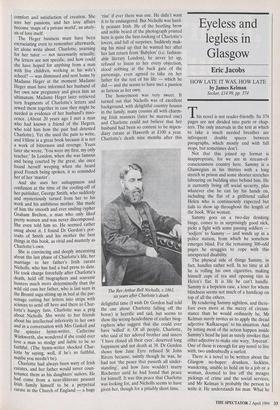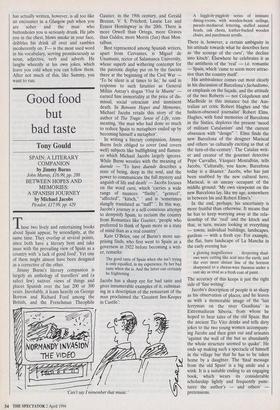Eyeless and legless in Glasgow
Eric Jacobs
HOW LATE IT WAS, HOW LATE by James Kelman Secker, £14.99, pp. 374 This novel is not reader-friendly. Its 374 pages are not divided into parts or chap- ters. The only intervals in the text at which to take a much needed breather are infrequent double spaces between paragraphs, which mostly end with full stops, but sometimes don't.
Not that this joined up format is inappropriate, for we are in stream-of- consciousness country here. Sammy is a Glaswegian in his thirties with a long stretch in prison and some shorter stretches labouring on building sites behind him. He is currently living off social security, plus whatever else he can lay his hands on, including the flat of a girlfriend called Helen who is continuously expected but fails to show up throughout the length of the book. Wise woman.
Sammy goes on a two-day drinking binge, comes to in surprisingly good nick, picks a fight with some passing soldiers — `sodjers' to Sammy — and winds up in a police station, from which he somehow emerges blind. For the remaining 300-odd pages he struggles to cope with this unexpected disability.
The physical side of things Sammy, in fact, handles rather well. In no time at all he is rolling his own cigarettes, making himself cups of tea and opening tins in Helen's flat. It is life he can't handle. Sammy is a hopeless case, a loser for whom blindness seems not much of a handicap on top of all the others.
By rendering Sammy sightless, and there- fore even more at the mercy of circum- stance than he would ordinarily be, Mr Kelman surely invites us to apply the dread adjective 'Kafkaesque' to his situation. And by letting most of the action happen inside Sammy's head he just as surely invokes that other adjective to make one wary, 'Joycean'. One of these is enough for any novel to live with; two undoubtedly a surfeit.
There is a novel to be written about the Glasgow no-hoper: drunken, feckless, wandering, unable to hold on to a job or a woman, doomed to live off the meagre pickings of crime and the social services, and Mr Kelman is probably the person to write it. He understands his man. What he has actually written, however, is all too like an encounter in a Glasgow pub when you are sober and the man who buttonholes you is seriously drunk. He jabs you in the chest, blows smoke in your face, dribbles his drink all over and rambles incoherently on. F— is the most used word in his vocabulary, serving promiscuously as noun, adjective, verb and adverb. He laughs wheezily at his own jokes, which leave you cold when you can follow them. After not much of this, like Sammy, you want to run.



























































 Previous page
Previous page